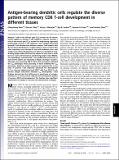| dc.contributor.author | Shen, Ching-Hung | |
| dc.contributor.author | Talay, Oezcan | |
| dc.contributor.author | Mahajan, Vinay S. | |
| dc.contributor.author | Leskov, Ilya B. | |
| dc.contributor.author | Eisen, Herman N. | |
| dc.contributor.author | Chen, Jianzhu | |
| dc.date.accessioned | 2011-07-14T15:06:42Z | |
| dc.date.available | 2011-07-14T15:06:42Z | |
| dc.date.issued | 2010-12 | |
| dc.date.submitted | 2010-07 | |
| dc.identifier.issn | 0027-8424 | |
| dc.identifier.issn | 1091-6490 | |
| dc.identifier.uri | http://hdl.handle.net/1721.1/64806 | |
| dc.description.abstract | Memory T cells of the effector type (TEM) account for the characteristic rapidity of memory T-cell responses, whereas memory T cells of the central type (TCM) account for long-lasting, vigorously proliferating memory T-cell responses. How antigen-stimulated (primed) T cells develop into different memory T-cell subsets with diverse tissue distributions is largely unknown. Here we show that after respiratory tract infection of mice with influenza virus, viral antigen associated with dendritic cells (DCs) was abundant in lung-draining lymph nodes (DLN) and the spleen for more than a week but was scant and transient in nondraining lymph nodes (NDLN). Correspondingly, activated CD8 T cells proliferated extensively in DLN and the spleen but minimally in NDLN. Strikingly, however, although most persisting CD8 T cells in DLN and spleen exhibited the TEM phenotype, those persisting in NDLN exhibited the TCM phenotype. Reducing antigen exposure by depleting DCs at the peak of primary T-cell responses enhanced the development of TCM, whereas subjecting primed CD8 T cells from NDLN to additional antigen stimulation inhibited TCM development. These findings demonstrate that differences in persistence of antigen-bearing DCs in various tissues regulate the tissue-specific pattern of memory CD8 T-cell development. The findings have significant implications for design of vaccines and immunization strategies. | en_US |
| dc.description.sponsorship | National Institutes of Health (U.S.) (Grant AI69208) | en_US |
| dc.description.sponsorship | Singapore-MIT Alliance | en_US |
| dc.description.sponsorship | National Cancer Institute (U.S.) | en_US |
| dc.language.iso | en_US | |
| dc.publisher | National Academy of Sciences (U.S.) | en_US |
| dc.relation.isversionof | http://dx.doi.org/10.1073/pnas.1016350108 | en_US |
| dc.rights | Article is made available in accordance with the publisher's policy and may be subject to US copyright law. Please refer to the publisher's site for terms of use. | en_US |
| dc.source | PNAS | en_US |
| dc.title | Antigen-Bearing Dendritic Cells Regulate the Diverse Pattern of Memory CD8 T Cell Development in Different Tissues | en_US |
| dc.type | Article | en_US |
| dc.identifier.citation | Shen, Ching-Hung et al. “Antigen-bearing Dendritic Cells Regulate the Diverse Pattern of Memory CD8 T-cell Development in Different Tissues.” Proceedings of the National Academy of Sciences 107.52 (2010) : 22587 -22592. | en_US |
| dc.contributor.department | Massachusetts Institute of Technology. Department of Biology | en_US |
| dc.contributor.department | Koch Institute for Integrative Cancer Research at MIT | en_US |
| dc.contributor.approver | Chen, Jianzhu | |
| dc.contributor.mitauthor | Chen, Jianzhu | |
| dc.contributor.mitauthor | Shen, Ching-Hung | |
| dc.contributor.mitauthor | Talay, Oezcan | |
| dc.contributor.mitauthor | Mahajan, Vinay S. | |
| dc.contributor.mitauthor | Leskov, Ilya B. | |
| dc.contributor.mitauthor | Eisen, Herman N. | |
| dc.relation.journal | Proceedings of the National Academy of Sciences of the United States of America | en_US |
| dc.eprint.version | Final published version | en_US |
| dc.type.uri | http://purl.org/eprint/type/JournalArticle | en_US |
| eprint.status | http://purl.org/eprint/status/PeerReviewed | en_US |
| dspace.orderedauthors | Shen, C.-H.; Talay, O.; Mahajan, V. S.; Leskov, I. B.; Eisen, H. N.; Chen, J. | en |
| dc.identifier.orcid | https://orcid.org/0000-0002-5687-6154 | |
| dspace.mitauthor.error | true | |
| mit.license | PUBLISHER_POLICY | en_US |
| mit.metadata.status | Complete | |
